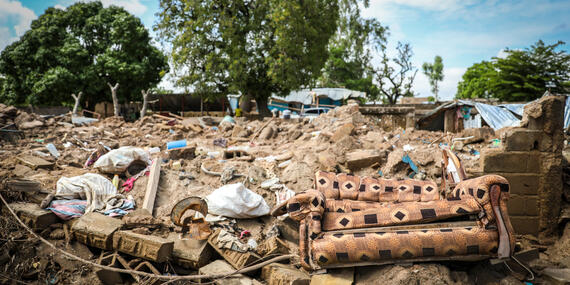Today's top news: Occupied Palestinian Territory, Sudan, West and Central Africa

Occupied Palestinian Territory
Access constraints continue to severely impede the delivery of life-saving humanitarian aid to hundreds of thousands of vulnerable people across the Gaza Strip.
OCHA reports that between 1 and 11 August, out of the 85 coordinated humanitarian assistance missions to northern Gaza, only 34 were facilitated by Israeli authorities. The rest were either denied, impeded or canceled due to security, logistical or operational reasons. The same is true for southern Gaza, where out of the 122 coordinated humanitarian assistance missions to areas in southern Gaza, 63 were facilitated by Israeli authorities – the rest were denied, impeded or canceled.
In total, since 1 August, about a third of aid missions within Gaza were denied by Israeli authorities.
The cumulative impact of these access constraints driven by intense hostilities and insecurity, challenges in moving between the north and the south and frequent evacuation orders is perpetuating a continued cycle of deprivation and distress among affected people who are facing death, pain, hunger, thirst, on a daily basis.
Sudan
OCHA continues to be extremely alarmed by the grim situation in Sudan, where heavy rains and flooding have affected 143,000 people across 12 of Sudan’s 18 states since June. Some 27,000 people have been displaced by the flooding.
The town of El Fasher in North Darfur has been among the hardest hit. Hundreds of homes have been damaged or destroyed at the Abu Shouk site for internally displaced people in El Fasher, where the Famine Review Committee warned just two weeks ago that famine conditions are likely ongoing.
The flooding is compounding people’s misery, as intense fighting in and around El Fasher in recent days continues to displace already vulnerable people and severely limits people’s access to basic services.
Access to the Abu Shouk camp and other areas of El Fasher remains extremely constrained due to fighting and flooding, challenging the ability of aid workers to scale up relief efforts in the worst-affected areas.
Despite these challenges, the UN and our humanitarian partners are working hard to deliver assistance in hunger hotspots – in Darfur and in other parts of the country. As we speak, WFP is distributing food for nearly 14,000 people in Sheikan, North Kordofan – one of the areas assessed as at risk of famine by the IPC.
We continue to reiterate the Secretary-General’s call for an immediate cessation of hostilities and for all parties to abide by their obligations under international humanitarian law to protect and allow safe passage for civilians and facilitate rapid and unimpeded humanitarian access.
West and Central Africa
OCHA is concerned about flooding in the West and Central Africa region which has already affected hundreds of thousands of people.
Just two months into the rainy season, torrential rains and severe flooding have impacted more than 700,000 people in the Central African Republic, Chad, Côte d'Ivoire, the Democratic Republic of the Congo, Liberia, Niger, Nigeria, Mali and Togo.
So far, Chad is the worst-hit, with more than 245,000 people affected by high water in just a few weeks.
Floods have destroyed or damaged more than 60,000 houses. Schools, medical facilities have also been affected, hampering access to health care and education.
Food production and security are also at stake with our humanitarian partners reporting at least 25,000 hectares of farmland damaged and 4,000 livestock killed.
The UN and humanitarian partners are supporting the responses by Governments of the region, including with the distribution of food, shelter, and water and sanitation assistance.
In 2024, the UN Central Emergency Response Fund allocated $10 million to Congo, Democratic Republic of the Congo and Niger to respond to emergencies related to climate shocks, including floods.
The 2024 seasonal forecast predicted above-average cumulative rainfall over the June to August and the July to September periods in areas already prone to flooding in the Sahel and some countries in West Africa. This will only deepen the needs of a population already vulnerable due to chronic poverty, conflict and political instability, and increase the resources required for the humanitarian response.
